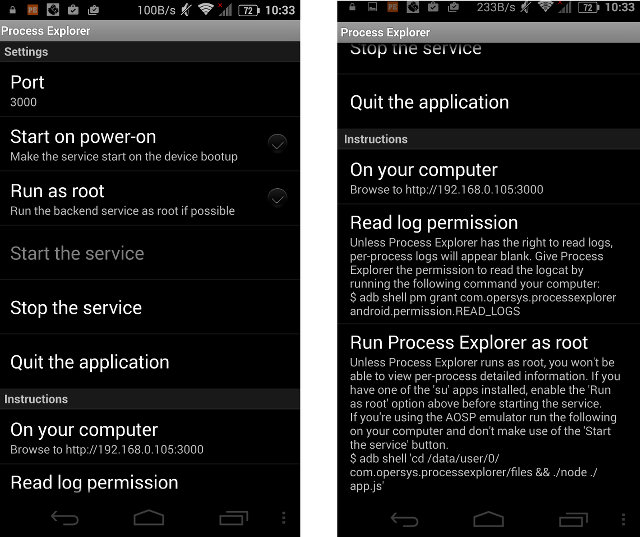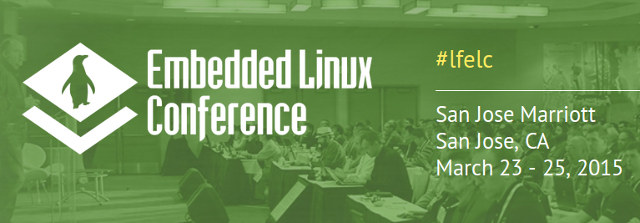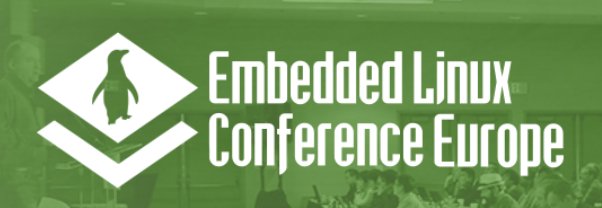Karim Yaghmour – founder of Opersys, a company specializing in Embedded Linux and Android training and development – is currently at Android Devcon 2016 were he gave a full day Embedded Android Workshop on August 1st, as well as a separate 1+ hour talk about Brillo/Weave internals on August 2, and more talks scheduled on the next two days about Android memory management, debugging and development, and Project Ara. He has just released the presentation slides on Slideshare, with the first “Embedded Android Workshop with Marshmallow” presentation totaling 175 pages, and dealing with Linux and Android concepts, overall architecture, system startup, the Linux kernel, hardware support, native user-space, Java for Android, JMI, AOSP, and more… The second presentation is much shorter with 29 slides, and deals specifically with Brillo / Weave internals including Embedded Linux, Android, Binder, DBUS, HAL, the source tree architecture, and so on. While you’d probably learn […]
Operys Process Explorer App Shows Android Processes in Your Computer’s Web Browser
Opersys is an Android and Embedded Linux company providing both development and training services, and they regularly attend conferences and release their training materials. The company has also developed a few Android apps to export the file system, the process list and info, and interaction between apps and Android system services exposed via Binder to your computer’s web browser. I found the most interesting app to be Process Explorer, so I gave it a try on Iocean M6752 smartphone. The application requires very little permissions to install, and it’s very simple to use. Simply tap on Start the service, and the app will provide the URL to browse the processes on your computer, in my case http://192.168.0.105:3000. The output is pretty useful, as you get much more information than you could get on your smartphone or tablet screen with CPU and memory usage, running time, logcat, etc… If you click […]
Embedded Linux Conference 2015 Schedule – IoT, Cars, and Drones
Embedded Linux Conference 2015 will take place in San Jose, California, on March 23 – 25, 2015, and will focus on Drones, Things and Automobiles. The schedule has been published, and whether you’ll attend or not, it’s always interested to have a look at what will be talked about to have a peak into the future of Embedded Linux, or simply keep abreast with the progress in the field. So as usual, I’ve gone through the schedule, and made my own virtual program with talks that I find interesting. Monday 23rd 9:00 – 9:30 – Driving standards and Open Source to Grow the Internet of Things by Mark Skarpness, Director of Systems Engineering at Intel Billions of devices are beginning to come online, and many of these devices, large and small, are running open source software. To fuel this innovation, it’s more important than ever for these devices to use […]
Embedded Linux Conference Europe 2013 Schedule – Build Systems, Security, Device Tree, Debugging & Profiling Techniques, and More
Embedded Linux Conference Europe 2013 will conveniently start right after LinuxCon 2013, last 2 days (October 23-24), and take place at the same location: the Edinburgh International Conference Center, Edinburgh, United Kingdom. The Linux Foundation has published the schedule for the conference, so I’ll make my own virtual schedule with sessions that I find particularly interesting. Thursday – 24th of October 9:30 – 10:10 – Timeline For Embedded Linux by Chris Simmonds, Consultant, 2net Limited Today, Linux is woven into the fabric of our technology. Things such as printers, routers, TVs and phones all have their own “Inner Penguin”. Yet it was never originally intended to be used beyond desktop and server PCs. A lot of things had to happen before Linux could break out of the PC environment and make its way in the world as a jobbing jack-of-all-trades. Since the early beginnings of embedded Linux in the late 1990’s many people have contributed […]
Inside Android’s User Interface – ELCE 2012
Karim Yaghmour, Opersys inc, talks about the internals of the Android user interface at Embedded Linux Conference Europe on November 5, 2012. Abstract: Android is a very complex stack comprising several dozens of novel components and moving parts. Still, it’s intrinsically a user-centric system and, therefore, its parts which deal with user interface are of special interest for anyone aiming to put Android in a device. This talk will examine the internals of Android’s user-facing components. Specifically, we will cover the inner-workings and interactions of the Window Manager, Surface Flinger, Input Method Manager, and the rest of the system. We will also cover key display and input components such as the Status Bar, Soft Keyboard and Notifications. This talk will be especially useful to developers intending to use Android in user-facing embedded systems, those needing to implement support for their graphics hardware and anyone interested in the internals of Android’s […]
LinuxCon North America 2012 Schedule
LinuxCon (North America) 2012 will take place on August 29 – 31, 2012 at Sheraton Hotel & Marina, in San Diego, California. The event will be co-located with the Linux Kernel Summit, the Linux Plumbers Conference, and CloudOpen 2012. LinuxCon consists of 3 days of keynotes, business and developers related sessions as well as tutorials. There will be over 80 sessions and keynotes during those 3 days. I’ll highlight a few sessions that I find particularly interesting and related to embedded Linux, software development and ARM. August 29 10:45 – 11:30 – Life After BerkeleyDB: OpenLDAP’s Memory-Mapped Database by Howard Chu, Symas Abstract: OpenLDAP’s new MDB library is a highly optimized B+tree implementation that is orders of magnitude faster and more efficient than everything else in the software world. Reads scale perfectly linearly across arbitrarily many CPUs with no bottlenecks, and data is returned with zero memcpy’s. Writes are on […]
Opersys Releases Their Android and Linux Training Materials
Opersys has decided to release their courseware under a Creative Common license (CC-BY-SA 3.0). The materials are available in PDF and ODP format for the following classes: Embedded Android – 5-days hands-on class covering Android (AOSP) for Embedded Systems (not only smartphones and tablets) Presentation Slides: PDF | ODP Exercises: PDF | ODT Android App Development – 5-day class to learn how to build your own Android Apps using Google’s SDK Presentation Slides: PDF | Tarball with Beamer files Exercises: PDF | ODT Embedded Linux– 4-days hands-On class learning about cross development, the kernel, the rootFS and the bootloader Presentation Slides: PDF | ODP Exercises: PDF | ODT Linux Device Drivers– 3-days hands-on class about modules, locking, interrupts and memory management, as well as char, block, network and USB drivers training. Presentation Slides:PDF | ODP Exercises: PDF | ODT You can freely use this material to learn more about Android and […]
Android Variants, Hacks, Tricks and Resources – AnDevCon II
The second Android developer Conference (AnDevCon II) took place about 10 days ago. Karim Yaghmour of OperSys published the presentation slides he used during his two Android presentations. The first presentation was Embedded Android Workshop, the same presentation he did at Android Open 2011. The second presentation “Android Variants, Hacks, Tricks and Resources” slides can be found below. Those 48 slides cover the following: AOSP’s limitations: Rigid, closed development model, excludes many things… Tearing AOSP apart Forks: Cyanogenmod: After-market handset firmware with custom launcher and lots of tweaks and mods… Replicant: 100% open souce with FDroid marketplace. MIUI: Closed source with UI enhancements. Ports: RIM Playbook: OMAP4 Tablet based on AOSP. Bluestacks: Android on Windows 7. Alien Dalvik: Android SDK + Meego SDK integration. Mods: XDA Developers. Melding with “Classic” Linux Stack: Rationale: Lots of available stacks in Linux, Android does not provide everything. Road blocks: File system, Bionic C […]








